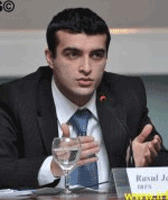Rasul Agagasan Jafarov
2010 Asia JusticeMakers Fellow, Azerbaijan

About Rasul
Since graduating in 2006 from the Western University in Baku, Azerbaijan with a LLB and LLM in International Law, Rasul Agagasan Jafarobi has championed the defense of human rights and legal protections for the socially vulnerable in his home country.
In 2007, he began reporting for the Institute for Reporters’ Freedom and Safety (IRFS), an Azerbaijani NGO focused on monitoring and reporting legal abuses against journalists, and providing counsel to such journalists. During this time he investigated numerous criminal cases against journalists, prepared reports surrounding the cases, and monitored the trials and legal correspondences at the IRFS. In 2009, Rasul launched the “Television and Alternative Media Development Center (TAMDC),” an NGO focused on advocating for alternative media sources.
In counseling sessions with journalists during and after their detention, Rasul learned that most of them were completely unaware of the legal rights prescribed to them under Azerbaijani law. This raised a question for him: if even journalists fail to recognize their legal protections, then how can regular citizens be expected to do so? This insight helped spark his zeal for criminal justice, ultimately leading to his 2010 JusticeMakers proposal.
The Problem
In Azerbaijan, the most pressing challenge in the criminal justice system is the general public’s lack of awareness and knowledge about their legal rights. Governmental bodies and civil society organizations should ostensibly fill this gap and provide the proper education on basic legal protections. Their public awareness projects, however, tend to highlight issues such as freedom of speech, gender equality and electoral rights, and ignore legal rights altogether. This has resulted in a situation of uninformed detainees without the slightest clue as to the first steps to take to protect their legal rights. Azerbaijan has a legal aid mechanism responsible for providing accused persons with counsel and countering the debilitating effects of insufficient public knowledge. But institutional weaknesses cripple this system. Law enforcement agents are not required to secure a lawyer for detainees unless specifically requested. And even when summoned, because of low pay, the lawyer often invests a minimal amount of time and energy into the case.
Results
Rasul used his $5,000 JusticeMakers Fellowship to advocate for the rights of the accused in Azerbaijan by holding trainings for detainees and their families. Collaborating with the Ministry of Justice, Mr. Jafarov offered legal assistance to various prisoners by preparing appeals, lawsuits and legal briefs. He also stated that, if certain fundamental rights are going to be denied before the domestic courts, he intends to bring the cases before the European Court of Human Rights.
In addition, he created a website where detainees could find useful information about their rights. This idea was the result of the insurmountable difficulties that Mr Jafarov encountered in obtaining access to prisons in order to provide training sessions to prisoners. He thought that a good solution to that problem was represented by the creation of the website. In this way, he was able to provide detainees with the information which were originally destined to be given during the trainings.